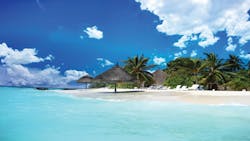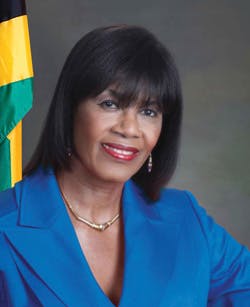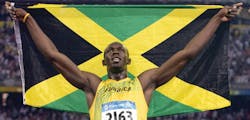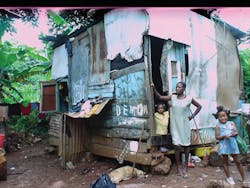Jamaica's Water Sector Not a Runaway Success
While the Caribbean Island of Jamaica benefits from its tropical setting and bountiful fresh water supplies, the nation's water infrastructure is creaking at the seams. Having once boasted one of the western world's first ever piped water supplies, a lack of private investment combined with poor planning has led to the prospect of drought conditions. Could the Chinese have the answer?
Jeremy Josephs reports.
For many merely to mention the Caribbean's fifth largest country is to conjure up images of water. And not without some justification. For Jamaica's indigenous people, the Taino, once referred to the island as Xaymaca - 'the land of wood and water'. Which prompts one to wonder what on earth their ancestors might make of the fact that despite there being rivers in virtually every one of its fourteen administrative parishes - water shortages remain a grim but regular feature of Jamaican life.
In fact earlier this year Water, Land and Climate Change Minister Bobby Pickersgill went so far as to warn his fellow countrymen that they should brace themselves for drought conditions.
This rather unimpressive water management hand is certainly not all attributable to poor planning. Jamaica is heavily dependent on agriculture and being situated within the tropics means that it is dependent on more than one rainy season. But some of it undoubtedly is.
To the extent that even if the island proves resistant to privatisation, the country's Prime Minister, the formidable Portia Simpson-Miller, has already briefed her ministers that they should busy themselves looking to partner with Chinese companies on a wide variety of water-related projects, a message which has been both well-received and acted upon in Beijing. There might well be an absence of agreed-upon criteria as to what makes a country developing rather than developed. But Jamaica nevertheless features on each and every list of less-developed countries. Which is not to imply, of course, that it is new to issues of water and sanitation. On the contrary, one of the first ever piped water supply systems in the whole of the western hemisphere happened to originate in Jamaica - in the town of Falmouth, to be precise.
With the Martha Brae River as its source, the Falmouth Water Works Company was established way back in 1799, its objective to supply both the local townsfolk and visiting ships.
Today it's the NWC (National Water Commission) which rules the roost, supplying more than two million people with water services daily and more than half a million of those people with wastewater services too. A statutory body, it operates under the auspices of Bobby Pickersgill's Ministry.
Facts and figures
The facts and figures seem impressive enough: the NWC produces more than 90% of Jamaica's total potable water supply from a network of more than 160 underground wells, 116 river sources and 147 springs. It operates more than 1000 water supply and 100 sewerage facilities across the island.
Its facilities include of 4000 km of pipelines and more than 500 km of sewer mains across the island. Altogether it supplies over 190 million gallons (720,000 m3) of potable water daily.
The NWC's PR machine has not been backwards in coming forward when it comes to the supply of convincing prose - its vision is 'for the NWC to be the number one water services utility in the Caribbean'.
Its mission is 'to contribute positively to national development' and its core-values inextricably bound up with issues of 'honesty, integrity, transparency, accountability, professionalism and self-sufficiency'.
Fine words – undoubtedly. But do they tally with what is actually happening on the ground, in the real world which affects the lives of real people? And to which the answer has to be, alas, not really.
The fact of the matter is that access to adequate sanitation stands at just 80%. This means that the poor - and notably the urban poor – live in the island's numerous (last official count: 595) squatter settlements in conditions which are both extremely unhealthy and unsanitary and where the risk of contracting a waterborne disease is high indeed. It is estimated that 10% of Jamaica's 2.7 million people live in such settlements - that's well over a quarter of a million.
And the very best of luck to the water technician who is prepared to venture into certain of these settlements - some are highly-dangerous no-go areas where rival gangs jealously guard their patch of territory - a fact which has undoubtedly contributed to Jamaica now having the fifth highest murder rate in the world. This again demonstrates that issues of water management cannot be assessed in isolation, as if cut off and apart from broader economic and social factors at play.
Under Pressure
For those homes fortunate enough to receive water, they often do so at low pressure. Most rural communities receive water that is not (or only irregularly) chlorinated. But perhaps most worrying of all is that a recent census revealed that 69% of Jamaica's households receive untreated drinking water.
Non-revenue water (NRW) runs at around a massive 66%. And the last official figures available reveal an even more depressing fact - that of the 277 million m3 of water produced, only 103 million m3 were consumed.
The NWC might well aspire to be the model for the whole of the Caribbean, but a World Health Organization (WHO) report reveals that it in fact has the second-lowest rate of drinking water coverage in the region.
The inability of the island's administrators to properly manage issues relating to agriculture has also resulted in the pollution of water due to soil erosion, deforestation and the over-use of chemicals in the agricultural sector.
The United Nations Environmental Program (UNEP) examined these very issues in Jamaica and concluded that in order to protect its water supply, the island had to develop legislative standards such as water quality norms and land use laws.
If you contact the NWC and the Ministry they will inform you that they are on to the case. Which perhaps they are. And no doubt with the very best of intentions.
Yet again, when it comes to their implementation on the ground there clearly remains much work to be done, the island's problems being compounded, of course, during the hurricane season which invariably provokes further service interruptions and increased incidences of water-borne diseases.
It would appear, then, if one may be so bold as to paraphrase Gilbert and Sullivan, that when it comes to water management issues in Jamaica, the island's lot is not a happy one.
Privatisation?
While privatisation has become a common currency in developed western economies, this isn't the case in Jamaica. At least not in respect of its water utilities.
For in truth privatisation did come to the island as part of a more distinct strategy of liberalisation and private-sector led growth. It hit the sugar industry in Jamaica with a vengeance and despite significant preparatory work it was considered to be a failure.
Jamaica's privatisation of the telecommunications industry, however, was generally hailed as a success. But the water sector, for better or for worse, somehow managed to remain above the fray. Until recently, that is.
For Jamaica's The Gleaner newspaper (which can hardly be described as a local rag on the grounds that it was established in 1834) recently called for the divestment of the NWC. Why? "Because the simple fact is that, as it now stands, the Jamaican Government cannot afford the NWC."
"approximately 189 million cubic metres a year of water is not paid for. most of it leaks away in old, rotten pipes"
It then proceeded to make a withering assault on the NWC. "The Government is currently negotiating with the International Monetary Fund (IMF) for an economic-support agreement. We need that agreement because Jamaica has amassed a Greek-style debt, the servicing of which consumes over half the Government's budget. Then there is the NWC itself.
"By its last published accounts, that company has a debt of more than J$10 billion ($96 million), which is a contingent liability of the Government. It has accumulated a deficit of J$17 billion ($164 million), to which another J$3 billion ($24 million) will be added this fiscal year," continued The Gleaner.
"That, of itself, is bad enough. But the situation is likely to get worse. Nearly 70%, or approximately 50 billion gallons (189 million m3) a year, of the water produced by the NWC is not paid for. Most of it leaks away in old, rotted pipes.
"It would make sense, therefore, to transfer the responsibility for the overhaul of the NWC infrastructure, and the cost of doing so, to the private sector, as the Government is being forced to do with other state companies," argued the paper.
Chinese delivery service
So far those siren voices calling for the privatisation of the water sector in Jamaica have not been heeded. But that does not mean that there is not movement in the air.
For the NWC has itself been looking for partners for water projects. But not looking towards the UK, the former colonial power and, one could be forgiven for thinking, its most natural ally, but out towards the East and Beijing.
For it was no less a figure than the country's Prime Minister, Portia Simpson-Miller (known locally as 'Mama P') who led discussions with the China Development Bank this summer with a view to implementing a number of critical water and sewerage projects worth billions of dollars.
The Prime Minister has said that based on current plans, it is estimated that US$1 billion is required to increase coverage, reliability and efficiency of potable water systems across the country with a further US$1 billion required to install new central sewerage systems in no less than sixteen major towns.
The government is proposing to go the route of Public Private Partnership (PPP) arrangements, using the Build, Own, Operate and Transfer (BOOT) approach, to implement one or more of the required three potable water treatment plants.
This is not to suggest, however, that home-grown projects have been put on hold. For just a few weeks ago the ground was broken for the US$12.6 million Lucea Pipeline Replacement Project.
Although only a six month project, it is set to provide employment for over 100 workers, and will facilitate the construction of a new 20 inch (508 mm) transmission pipeline through Lucea, to allow water from the Great River Treatment Plant to better supply all areas along the corridor leading into Negril.
Minister Pickersgill was out and in fine form, boasting that the project "represents the government's commitment to employing the necessary technology and resources to monitor, model, map and manage the nation's surface and groundwater resources "far better than we have ever done in our history".
This happens to dovetail with the Jamaican government's 'Vision 2030 Jamaica' National Development Plan.
"Vision 2030 Jamaica plans to ensure the development of world-class transport, telecommunications, water supply and sanitation infrastructure that can contribute to the competitiveness of Jamaican producers and improved quality of life for the Jamaican people." More fine words? Possibly so – only time will tell.
Bolt from the blue
Of course no country profile of Jamaica would be complete without mention of its global icon Usain Bolt. Eight times world champion, six times Olympic champion and the world's fastest man.
And what might all that have to do with water issues? Well, everything, as a matter of fact. At least according to a certain Jamaican gentleman by the name of Daryl Vaz from Buff Bay, Portland and who recently wrote this to the editor of that august journal The Gleaner. Few would argue that he has a point.
The Editor, Sir:
"I read with interest and amazement a headline "Falmouth to get statue of Usain Bolt" and, whereas I have no issue with that, it brings to mind that Usain's birthplace, Sherwood Content, still after his rise to fame, continues to have major water woes.
"I would have thought that with all he has done for our beloved country, and continues to do, his home town and its residents would have finally got a water supply.
"This would be far more appreciated I'm sure by Usain and his family.
"I'm am really hoping and praying that the promise of water becomes a reality in light of the billions of dollars spent every year and the Government's announcements of the billions of more dollars to be spent under the National Water Commission's programme.
"Let's hope that with all the glory and fame that Usain has given Jamaica another Olympics and IAAF World Championships would not have come and gone without the residents of that community getting piped water.
"Over to you Members of Parliament, Minister of Water, and Prime Minister."
Over to you, indeed. It all leads one to conclude, unfortunately, that when it comes to Jamaica's water, it has been anything but a runaway success.
Jeremy Josephs is a freelance correspondent for WWi magazine. For more information, contact: [email protected]






